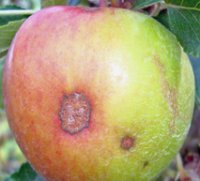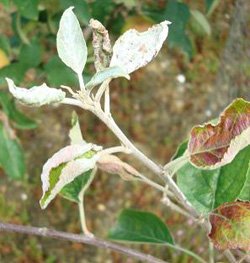

Organic growing of any fruit or vegetable is challenging, although annual crops like Potatoes and Carrots are successfully grown in the UK. Strawberries are also grown relatively easily. However when it comes to perennial crops like English Organic Apples the challenge is far greater. There are many challenges ahead for any Organic Apple grower, overcoming Pest and Disease and maintaining Nutritious soil conditions among the many obstacles.
Nutrition is probably the greatest obstacle to this and other perennial crops. With strict codes of practice governing Organic Apple production, growers are very limited in what they can use to control Pests and Diseases; while Pests are troublesome they can in many cases be overcome by clever use of natural Predators. Controlling disease is a more difficult problem and is very much influenced by two factors, the weather and nutrition. The ideal climate for growing Organic Apples is one where the soil is high in Nutrients, the Rainfall is low and there is ample water; the reason why most Organic Apples found on Supermarket shelves are grown in far off lands like Washington State in the USA or areas of New Zealand;
 In England we suffer a variable climate with, at times, very heavy rainfall. Scab, which which in its fully developed visual stage appears as black sooty blotches on the leaves and subsequently the fruit, spreads as an airborne fungus from one site to another; overwintering on dead leaves and other debris on the orchard floor and on badly infected trees from last seasons young growth.
In England we suffer a variable climate with, at times, very heavy rainfall. Scab, which which in its fully developed visual stage appears as black sooty blotches on the leaves and subsequently the fruit, spreads as an airborne fungus from one site to another; overwintering on dead leaves and other debris on the orchard floor and on badly infected trees from last seasons young growth.
Mildew, another hazard of apple growing can also be devastating, infecting young shoots and effectively ruining new growth and cropping performance; again this disease overwinters on the tips of shoots and reappears on fruit buds as 'primary' mildew in the new season and in the right weather conditions; hot and dry, will spread rapidly to new shoots and young fruitlets which become malformed and ripen prematurely.
 Nutrition is a key aspect of a healthy tree which will, just like healthy humans, be more able to resist disease. Key to good vegatative growth in an apple tree is an infusion of Nitrogen in the spring time and as Organic Codes of Practice do not allow the easy option of a dose of Nitrogen in the form of chemical fertilizer, finding Naturally produced fertilizers has been a challenge; however the refinment of chicken manure has given the Organic Apple Grower a helping hand, although this brings with it thousands of weed seeds which cannot be controlled economically for Organic Apples by any other means than cultivation; fortunately there are cultivators which can be attached to a tractor and when driven up the side of a row of trees can, with sensors move around the tree trunk, avoiding damage to the tree, however this needs to be repeated every few weeks throughout the growing season; by comparison conventional production allows a Herbicide application which will contol weeds under the trees much more economically; failure to control weeds results in trees suffering nutrient deprivation.
Nutrition is a key aspect of a healthy tree which will, just like healthy humans, be more able to resist disease. Key to good vegatative growth in an apple tree is an infusion of Nitrogen in the spring time and as Organic Codes of Practice do not allow the easy option of a dose of Nitrogen in the form of chemical fertilizer, finding Naturally produced fertilizers has been a challenge; however the refinment of chicken manure has given the Organic Apple Grower a helping hand, although this brings with it thousands of weed seeds which cannot be controlled economically for Organic Apples by any other means than cultivation; fortunately there are cultivators which can be attached to a tractor and when driven up the side of a row of trees can, with sensors move around the tree trunk, avoiding damage to the tree, however this needs to be repeated every few weeks throughout the growing season; by comparison conventional production allows a Herbicide application which will contol weeds under the trees much more economically; failure to control weeds results in trees suffering nutrient deprivation.
Control of the major seasonal diseases affecting Apples, Scab and Mildew, rely on good weather and the use of Natural compounds Copper and Sulphur as regular sprays.
Copper helps reduce scab by early season use and sulphur is the only effective means of reducing Mildew apart from a labour intensive removal of infected shoots with secatuers.
So it is not surprising that the cost of Organically produced apples is greater than conventional production and the yields are often no more than 50% depending on variety. Variety also has a major part to play, as some varieties, for example Discovery, have a natural resistance to scab making this variety an ideal part of an Organic Apple Growers orchard. However the variety is fast losing its appeal as a conventional apple for the retailer as its short shelf life often disappoints the consumer, especially in the face of more appealing imported apples like Braeburn and Gala, so we could well find it only survives as an Organic or Farm Shop apple. In its defence Discovery and other Organic Apples have a better inherent shelf life than conventional apples and therefore stand up much better in the marketplace, so there is no reason why Discovery cannot remain a successful Organic Apple, albeit only available in August and early September.
A real problem for the success of English Organic Apples was the inability of our recognised favourites, like Cox to be grown successfully as an Organic variety due to its lack of natural resistance to diseases; the majority of consumers appear to seek out Organic versions of popular conventional apples; in recent years a government sponsored LINK programme where experts from the industry; The English Apple Man was one; including representatives from major Supermarkets attempted to find varieties which had the best potential as English grown Organic Apples, this identified a number of varieties, but none apart from Discovery were household names, so to succeed as English Organic Apples it was felt necessary to persuade the consumer to buy these instead of the 'easy option' of picking up Organic Apples grown in some far off land, not exactly in keeping with the aims of holistically grown Organic produce. Varieties like Saturn, Raijka, Pinova, Santana etc..appeared to be the only option for UK Organic apple growers, however in the last few years while many organic growers have pursued this policy, some organic growers, supported by their agronomists have managed to grow mainstream varieties like Gala and Spartan successfully as Organic apples.